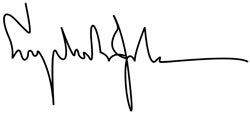By the President of the United States of America
A Proclamation
World trade joins the United States with other nations in a creative partnership that supports the growth of our free enterprise economy and advances the well-being of all our citizens.
Last year, total trade among the non-communist countries amounted to about $180 billion. Since 1960, this trade has grown by more than $67 billion, or an annual rate of more than 8 percent. Trade among the nations of the free world should reach the astounding annual rate of $200 billion in the year ahead.
The exchange of goods and services builds a foundation for mutual trust among nations. It sustains our hopes for the attainment of a better world, in which all peoples may live in peace.
Expanding trade with nations around the world accelerates the pace of economic progress at home and abroad.
—It enlarges the opportunities for United States businessmen to sell more products and services in world markets. Since 1960, U.S. exports of merchandise have risen by 50 percent. In 1966, they exceeded $29 billion, close to $3 billion more than the year before.
—It provides employment for more American workers. About three and a half million Americans are engaged, directly or indirectly, in the production, transport and marketing of our exports. The growth of this trade will create jobs for many more workers in both rural and urban areas throughout the United States.
—It widens the range of materials and consumer goods available at competitive prices in the domestic marketplace.
—It helps the developing countries make fuller use of their energies and resources.
—It encourages the international exchange of ideas, knowledge, and experience.
Vigorous expansion of our export volume is essential. We have succeeded in reducing the deficit in our balance of payments, but we must make still further improvement.
The United States will continue to support the reciprocal reduction of trade barriers to stimulate the flow of international commerce. To this purpose, an early and successful completion of the Kennedy Round of trade negotiations is especially important. There are only a few weeks remaining; by April 30, major issues must be settled and a balance of concessions achieved. The final agreement must be signed by June 30. An historic opportunity to broaden vastly the world's trade horizons is within reach. This opportunity must not be lost.
We are negotiating with other nations on the improvement of the international monetary system. International agreement that will assure an adequate growth of world reserves is a key to the future expansion of world trade.
We believe that trade also offers a means of achieving fruitful cooperation with the Soviet Union and other Eastern European nations. In 1966, U.S. exports to Eastern Europe totaled only $200 million while other non-communist countries sold Eastern Europe goods worth over $6 billion. U.S. ratification of a consular agreement with the U.S.S.R., our various trade missions to Eastern Europe, and our participation in the 1967 food processing fair in Moscow illustrate our effort to build bridges through trade. We must continue to pursue lasting peace by seeking out every possible course to healthy economic and cultural relations with these countries.
The principal objective of our foreign trade policy is to promote the increase of peaceful, profitable commerce among our Nation and others.
World Trade Week reaffirms and supports this objective.
Now, Therefore, I, Lyndon B. Johnson, President of the United States of America, do hereby proclaim the week beginning May 21, 1967, as World Trade Week; and I request the appropriate Federal, State, and local officials to cooperate in the observance of that week.
I also urge business, labor, agricultural, educational, professional, and civic groups, as well as the people of the United States generally, to observe World Trade Week with gatherings, discussions, exhibits, ceremonies, and other appropriate activities designed to promote continuing awareness of the importance of world trade to our economy and our relations with other nations.
In Witness Whereof, I have hereunto set my hand and caused the Seal of the United States of America to be affixed.
DONE at the City of Washington this twenty-fourth day of March, in the year of our Lord nineteen hundred and sixty-seven, and of the Independence of the United States of America the one hundred and ninety-first.

LYNDON B. JOHNSON
By the President:
DEAN RUSK
Secretary of State
NOTE: Proclamation 3771 was not filed with the Office of the Federal Register before the cutoff time of this issue. As printed above, it follows the text of the White House press release.
Lyndon B. Johnson, Proclamation 3771—World Trade Week, 1967 Online by Gerhard Peters and John T. Woolley, The American Presidency Project https://www.presidency.ucsb.edu/node/306074

